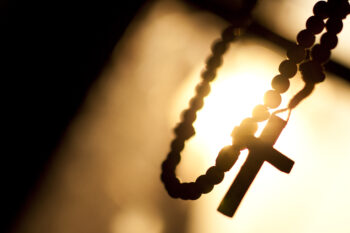
The Christian Institute has threatened legal action against the Northern Ireland Executive if a ban on so-called ‘conversion therapy’ is introduced that includes what it terms ‘prayer’. The Institute says such a ban would breach the rights of Christians. But Northern Ireland Humanists believes such a case may be ‘fundamentally flawed’. This is because manifestations of religious beliefs can be restricted if they harm others.
Jason Coppel QC, acting for the Institute, said if the ban includes conversion therapy through ‘prayer, preaching, or pastoral work’, this would breach the rights of Christians and criminalise their religious beliefs. This is based on Article 9.1 of the European Convention on Human Rights (ECHR) which says:
‘Everyone has the right to freedom of thought, conscience and religion; this right includes freedom to change his religion or belief and freedom, either alone or in community with others and in public or private, to manifest his religion or belief, in worship, teaching, practice and observance.’
But Article 9.2 says:
‘Freedom to manifest one’s religion or beliefs shall be subject only to such limitations as are prescribed by law and are necessary in a democratic society in the interests of public safety, for the protection of public order, health or morals, or for the protection of the rights and freedoms of others.’ [emphasis added]
There is strong evidence that conversion therapy is harmful. This can be particularly true in places of worship. Conversion therapy has been widely rejected by the medical community. There is no evidence that it is effective and it can cause significant damage to mental health. Such practices legitimise homophobic, biphobic, and transphobic attitudes by falsely equating LGBT identities to a pathology that can be fixed or cured. According to the UK Government, 7% of LGBT people have undergone or been offered such practices. 51% of those who have undergone conversion therapy report that it was conducted in a religious setting. Such activities can include exorcisms and forced prayer. Given this, Northern Ireland Humanists believes it would be lawful to restrict these activities.
Northern Ireland Humanists Coordinator Boyd Sleator commented:
‘Humanists are strong advocates for freedom of religion or belief, but only so long as it does no harm to others. Conversion therapy is a highly coercive practice that can be deeply harmful to those who experience it. We know it is within religious settings that the most damaging types of conversion therapy, such as exorcisms and forced prayer, occur. When people are experiencing such extreme distress over their sexual orientation or gender identity, they should be met with person-centred, therapeutically well-grounded support. They should not face coercive, medically worthless practices that seek to push them in a particular direction.
‘A ban is needed to protect the health, rights, and freedoms of LGBT people.’
Notes:
For further comment or information, please contact Northern Ireland Humanists Coordinator Boyd Sleator at boyd@humanists.uk or phone 02890 029946.
Read more about the Christian Institute’s proposed case.
Read more about our work on conversion therapy.
Northern Ireland Humanists is part of Humanists UK, working with the Humanist Association of Ireland. Humanists UK is the national charity working on behalf of non-religious people. Powered by 100,000 members and supporters, we advance free thinking and promote humanism to create a tolerant society where rational thinking and kindness prevail. We provide ceremonies, pastoral care, education, and support services benefitting over a million people every year and our campaigns advance humanist thinking on ethical issues, human rights, and equal treatment for all.
In 2021, Humanists UK is celebrating its 125th anniversary with a renewed focus on its history. The new website Humanist Heritage is a rich new web resource that uncovers the untold story of humanism in the UK – a story of people, groups, objects, places, movements, publications, and ideas.
